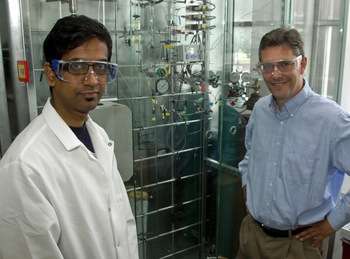Aviation offers a way forward in biofuels research

(Phys.org) —Biofuels researchers are increasingly thinking about how the energy market is changing, which challenges them to balance the basic science of new fuels with a more holistic view of the most commercially viable ways to produce them. So when a group of University of Wisconsin-Madison researchers began looking at how to make jet fuel from biomass, they also strived to create a "techno-economic" framework that would illuminate the entire biofuels field.
In a paper published in Energy & Environmental Science, George Huber, a professor of chemical and biological engineering at UW-Madison, and his collaborators mapped out an integrated approach for processing red maple biomass into a jet fuel that costs $4.75 a gallon. Supported by funding from the DARPA Office of Science, Huber's study improves on previous research by factoring in the impurities of real biomass, an inefficiency that's not accounted for in studies that use model compounds as a starting point.
"Most biofuels research has focused on small aspects of an entire bio-refinery," says Aniruddha Upadhye, a Ph.D. student in Huber's group and one of the paper's co-authors. "There was a lack of understanding of what the integrated process would look like."
Huber focused on jet fuel in anticipation of a declining demand for gasoline. Hybrid and electric cars mean the biofuels sector might do well to focus less on the fuels that power lighter vehicles and more on heavy-duty fuels for trucks, planes, and other heavy machinery. "Unfortunately, you can't power heavy machinery with batteries," Huber says.
So in this context, papers like Huber's offer a chance for biofuels researchers to establish some long-term priorities.
"We found out that techno-economic evaluation helps in focusing in areas that make the most economic sense," Upadhye says. "We can use process design as a way to drill down on the areas that make most economic impact."
Just as importantly, experimenting with an integrated process helped the group figure out where the process needs to become more efficient. To be truly viable, the cost needs to come down from $4.75 to about $3 per gallon. One of the group's next steps will be to identify a catalyst other than the expensive platinum, and to find sustainable solvents that can be used in place of water. "The wastewater treatment costs actually dominate the operating costs," Upadhye says.
Huber says the paper's findings will keep UW-Madison at the forefront as biofuels researchers continue to pursue better processes that industry partners can then scale up.
"The major lesson learned is that you can produce renewable distillate fuels using new technologies from biomass in an integrated process," Huber says. "The approach we outline here is a novel one that had not previously been used and is a lot cheaper than existing methods."
Journal information: Energy & Environmental Science
Provided by University of Wisconsin-Madison

















